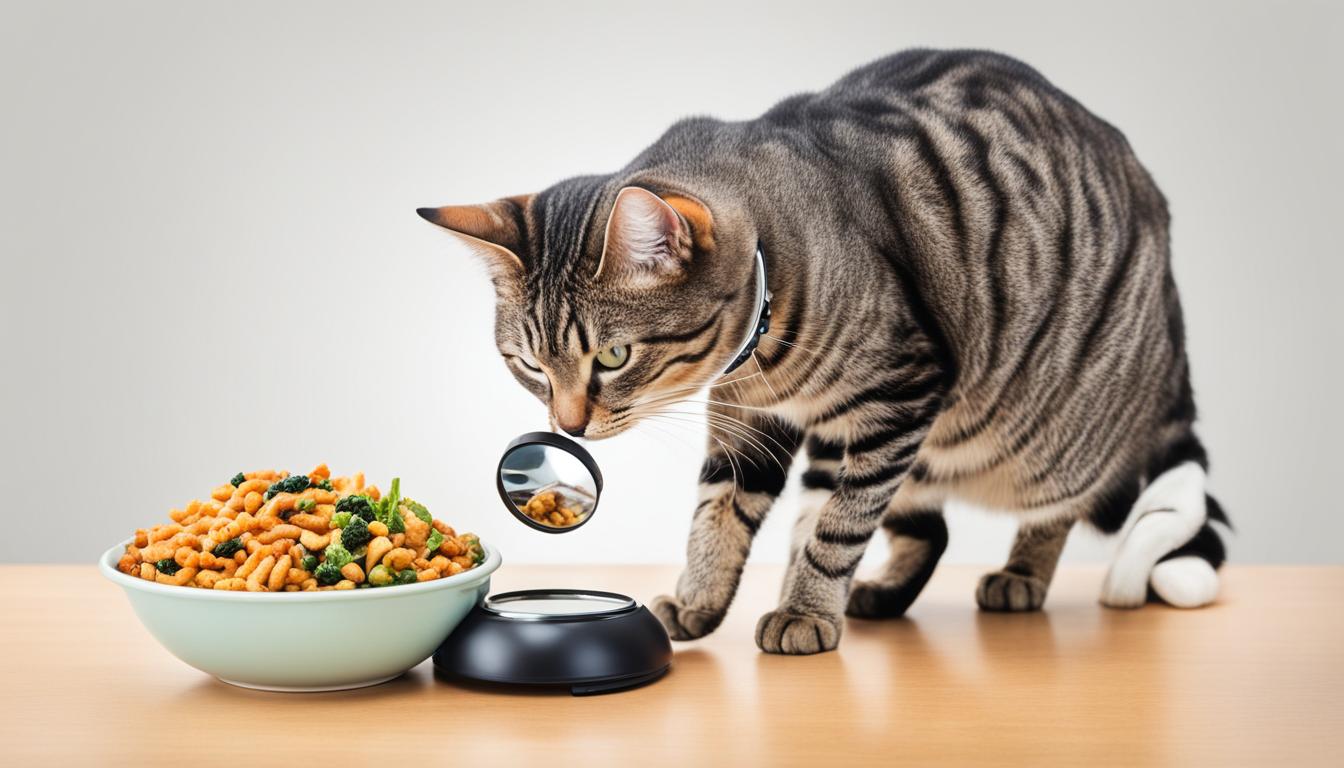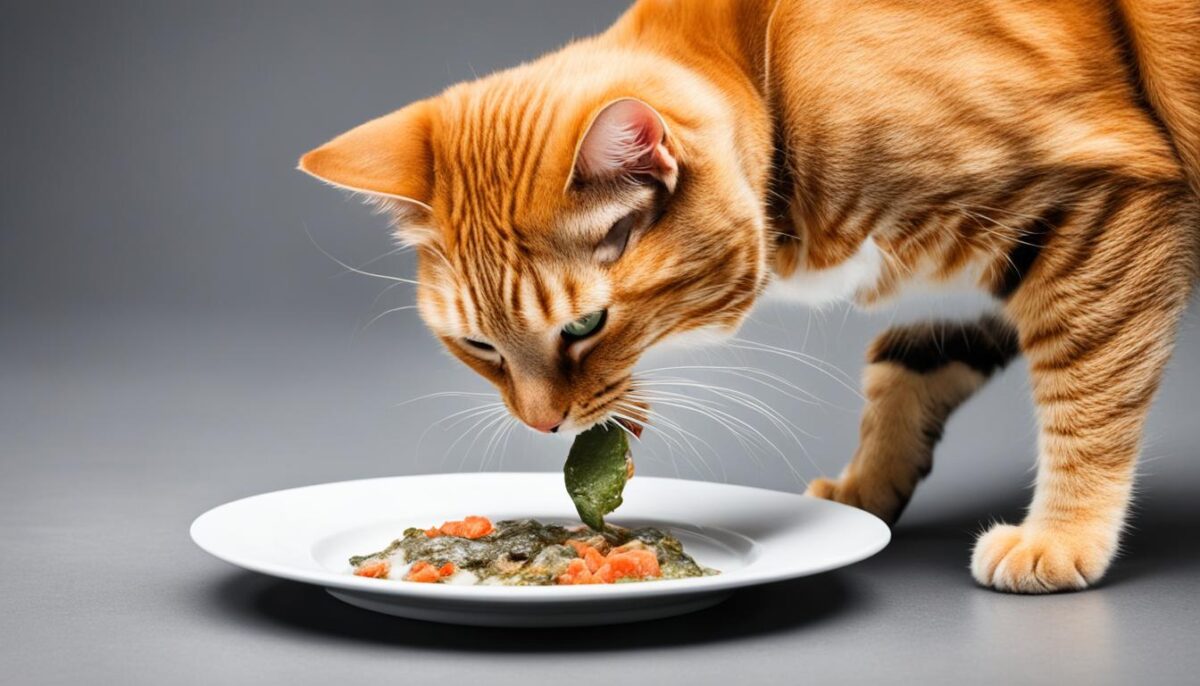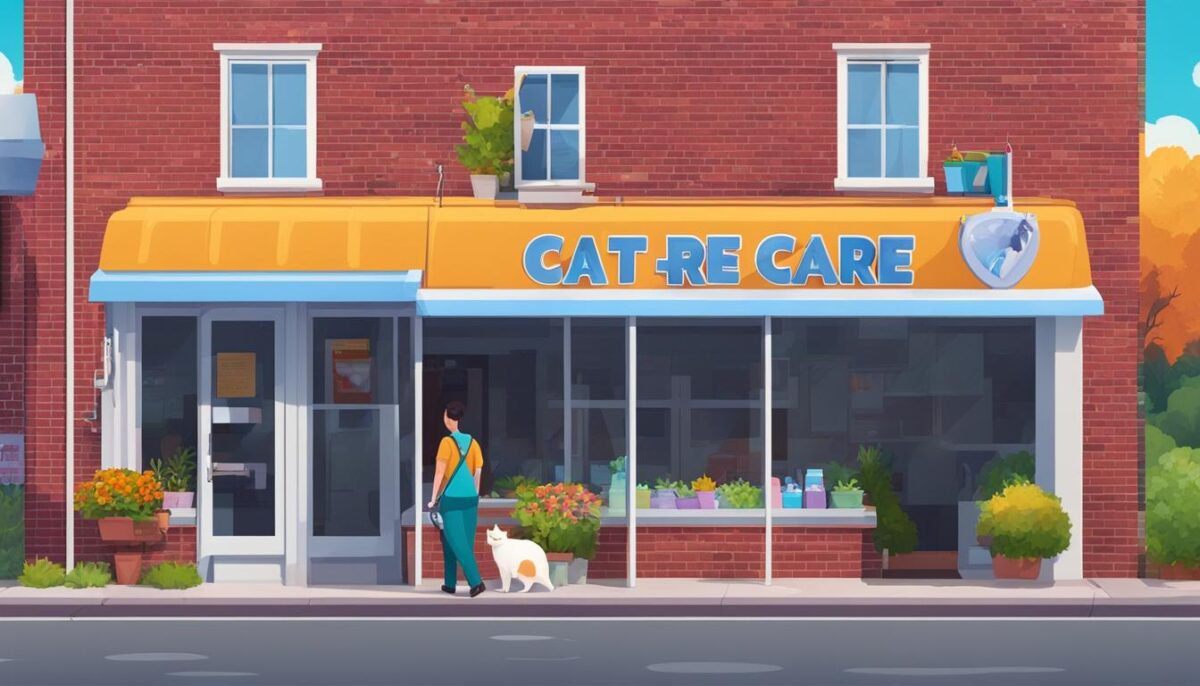Hey there! Have you ever had a stomach ache? Well, your furry friend can have tummy troubles too. Cats can get sick in their stomach just like people. These problems are called “stomach bugs.” It’s not fun for them, and they can feel pretty bad.
When a cat gets a stomach bug, they may not feel like eating or they might have to go to the bathroom a lot. It’s hard to see them like this, but there are things you can do. A clean litter box and washing hands can keep both you and your kitty safe.
Sometimes, kittens can get a really tough stomach bug called rotavirus. This can make them have very watery poop and not want to eat. It’s especially hard on little ones. If they get this, they might need to see the vet. But don’t worry, vets are like doctors for pets and they know just what to do.
If you think your cat isn’t feeling well, remember it’s important to give them a calm space away from noise and other pets. This will help them rest and start to feel better.
We’ve looked at the basics of cat health and stomach bugs, but there’s more to know. Here’s what to keep in mind:
Key Takeaways
- Cats can get stomach bugs that make them feel sick.
- A sick cat may not eat and can have bathroom troubles.
- Keep their litter box clean and wash your hands for your cat’s health.
- Rotavirus is a tough stomach bug for kittens.
- Vets can help cats feel better when they have a sickness in their belly.
- Give your sick cat a quiet place to rest and get well.
Understanding Stomach Bugs in Cats
Does your cat have an upset tummy? Sometimes, our furry friends get tummy troubles too. It’s important to know why this happens and what signs to look for. This way, we can help our cats feel better!
Common Causes of Feline Gastrointestinal Problems
Cats can get upset tummies for many reasons. They may eat something bad or have a sudden change in their food which can give them digestive sensitivity in cats. Stress or worry can also cause feline gastrointestinal issues. Cats clean themselves a lot, and sometimes they swallow too much hair. This can lead to hairballs, which can sometimes be tough to pass and cause cat stomach problems.
Signs Your Cat May Have a Stomach Bug
If your cat isn’t acting like their normal self, they could have a stomach bug. Look for things like cat vomiting and diarrhea, being tired, not playing, and not wanting to eat.
If you see your kitty not feeling well, acting strangely, or having a sore belly, they might be sick with stomach issues.
Recognizing these symptoms of cat stomach issues is key to knowing when your cat needs help.
Are Certain Breeds More Susceptible?
All cats can get sick in their stomachs, but are some feline breeds more likely to get these bugs? It turns out that little kittens and older cats might be more at risk and need extra care for their cat digestive health.
Here’s a table that shows which cat breeds might be more likely to have tummy issues:
| Breed | Stomach Bug Susceptibility | Notes on Digestive Sensitivity |
|---|---|---|
| Persian | High | These cats have long fur which can lead to more hairballs. |
| Sphynx | Medium | They may have sensitive tummies because of their unique skin. |
| Siamese | Medium | This breed can be sensitive to sudden changes in diet. |
Remember, every cat is different. Even within the same breed, some cats might have tougher tummies than others. It’s always good to be careful and watch out for any signs that your kitty isn’t feeling well.
Can Cats Get Stomach Bugs?
Yes, your furry friends can get stomach bugs just like you do. When your cat is not feeling well because of these bugs, they might need some extra love and care. Keeping their home clean and their food safe will help make their stomachs feel good.
Learning about feline health issues is important for taking care of your pet. If your cat has tummy troubles, it could be a sign of a gastrointestinal illness. This means their belly is upset and they need your help.
| What to Watch For | How You Can Help |
|---|---|
| Your cat is not eating | Give them a quiet and comfy place to rest |
| Your cat is vomiting or has diarrhea | Make sure they have water to drink and see if they eat special food from the vet |
| Your cat is acting tired | Spend time with them and keep their bedding clean |
Take care of your cats when they have stomach bugs and remember, clean spaces and good food keep pets happy!
Rotavirus and Other Viral Infections in Cats
Cats, just like people, can catch tiny germs called viruses. One not-so-nice germ is something called feline rotavirus. It can make kittens feel really bad, causing them to have watery poop and not want to eat. Kitten health is super important, so when they get sick, they might need a little extra help from the vet.
Rotavirus: A Serious Concern for Kittens
Kittens are tiny and still growing, which means their bodies have a hard time fighting off germs. This is why feline rotavirus is a bigger worry for them. To help our furry friends, we need to keep things clean. This means washing our hands a lot, especially after we play with kittens or touch things they use like their food bowl.
Diagnosing Viral Infections in Felines
When we worry that a kitten might be sick with a virus, vets can do special checks. They might look at the kitten’s poop or use cool tools to peek inside their belly. By doing this, vets are identifying cat illnesses and making sure that kittens get the right medicine to help them feel better.
Treatment and Prevention Strategies for Viral Conditions
If a kitten has a rotavirus, the vet will make sure they get enough water to drink and might say they need to eat special food for a bit. Little kittens can sometimes get help from their mom’s milk, which is full of good stuff that keeps them safe from viruses. Caring for kittens and managing kitten illnesses also means keeping them far away from other animals that might be sick.
The Risk of Salmonella in Cats
Did you know that tiny germs called salmonella can make your furry friend sick? It’s true, and what’s more, these germs can travel from cats to people too. This is a type of sickness that animals and people can share, and it’s very important to keep clean to stay healthy.
Zoonotic Risks: Can Humans Catch It from Cats?
Being around your cat is lots of fun, but sometimes they can carry germs without even looking sick. If your cat has these germs, called salmonella, they can pass it to you. That’s why washing your hands after playing with them or cleaning their litter box is super important, especially if they have been unwell.
How to Recognize Salmonella Infection in Your Pet
Is your cat not acting like itself? Maybe they don’t want to eat, seem really tired, or have a hot fever. Sometimes they might lose weight or have poop with blood in it. These could be symptoms of salmonella in cats. If you see anything like this, it’s time for a vet visit.
| Symptoms of Salmonella in Cats | What to Do |
|---|---|
| Not wanting to eat | If they skip meals, see your vet |
| Fever and tiredness | Take their temperature and rest |
| Weight loss | Keep track of their weight weekly |
| Bloody poop | Clean the litter box and inform the vet |
Remember, getting sick with salmonella is a real human risk from feline salmonella that both you and your cat can face. Pay close attention to your kitty and their habits to be sure they stay purring and healthy!
Managing Your Cat’s Digestive Health
Keeping your kitty’s belly happy is like taking care of a little fur-covered engine. Just like cars, their tummies need the right kind of fuel—which means giving them the right food and plenty of fresh water. If your cat has lots of fur, help them out by brushing them often. It’s like giving them a little spa day to cut down on hairball hiccups. And hey, if your cat seems a bit under the weather or isn’t acting like their usual playful self, it’s never a bad idea to take them to the vet. That’s like taking your car to the mechanics to make sure everything’s running smoothly.
You want your fuzzy friend to stay healthy, right? Well, here’s a cool way to see how you can do just that:
| What to Do | Why It Helps | Good for Kittens? | Good for Adult Cats? |
|---|---|---|---|
| Give them cat food that’s just right for them | Keeps their digestion on track | Yes, it helps them grow! | Yep, keeps them strong. |
| Always have a bowl of clean water | Helps with hydration and pet stomach maintenance | Super important for little ones | Just as important for big ones |
| Brush their fur to help with hairballs | Makes it easier on their tummy | Good practice early on! | Helps a bunch! |
| Visit the vet if they seem sick | For checking up on their cat digestive care | Absolutely! | Yes, for sure! |
Remember, maintaining feline health is a way to show you care. It’s all about keeping an eye on them and knowing what’s best. When in doubt, ask for help. That’s what vets are for—to make sure your purring pal stays in tip-top shape!
When to Seek Vet Care for Cat Stomach Issues
Watching your cat and observing cat behavior can tell you a lot about their health. Tracking cat health is important, especially if they start acting differently. Does your furry friend seem less excited about mealtime? Are they meowing in a sad, different way or hiding in quiet spots around your house? These could be signs of cat illnesses.
It’s important to keep an eye out for these changes. They might mean your cat is feeling sick with a tummy bug. Cats can’t tell us in words when they hurt, so we need to be super good at watching for these small signs.
Monitoring Your Cat’s Symptoms
Keep a close watch on what your cat does every day. How much are they eating? Are they going to the bathroom okay? Do they want to play like they usually do? If things seem off, it may be time to act.
The Importance of Timely Veterinary Intervention
If you notice your cat has a tummy ache or isn’t feeling well, prompt treatment for feline illnesses is key. A quick trip to the vet can help a lot. The vet is like a doctor for pets, they know just what to do to make animals feel better. And, if you ever find yourself in a pet health emergency, remember that it’s important to get your whiskered buddy to the vet as fast as you can. Fast help can make all the difference for your pet!
Hairballs vs. Stomach Bugs: How to Tell the Difference
Do you sometimes find odd, wet, and hairy clumps around the house? You might wonder if these are just hairballs or signs of a stomach bug in your cat. Let’s explore how to tell them apart.
Identifying Hairballs
Hairballs look like wet, hairy tubes. They’re not food or treats, but something cats make when they clean their fur with their tongues. They lick and swallow hair. Most times, it’s not a big deal. You might see a hairball once in a while. If you help your cat by brushing them, you can keep hairballs from happening too much.
When Is a Hairball Actually a Sign of Something More?
Having a hairball more than once a month might mean something else is going on. It’s a sign to look at your cat’s food or to see if they’re okay. Let’s check out what’s normal and what’s not with hairballs.
| Normal Hairball Signs | Worrying Hairball Signs |
|---|---|
| Hairball once a month or less | More than one hairball a month |
| Cat is eating, drinking, and playing well | Cat is not eating or playing like usual |
| Hairball is small and passes easily | Large hairballs or having trouble passing hairball |
| No changes in bathroom habits | Changes in how often they go potty or what it looks like |
If you see the worrying signs, it’s time to see a vet. They can tell if your cat is having cat grooming issues, or something else like a tummy bug. They help you know how to keep your cat feeling good. So look out for the signs: hairballs every now and then are okay, but a lot of hairballs could mean your cat needs help.
Conclusion
Feline friends are like family, and it’s super important to keep them feeling good. When stomach bugs show up, they can make your cat feel not so great. But, with your care and lots of love, they can bounce back to being their playful, cuddly selves. Make sure to wash your hands well and keep their bowl and bed nice and clean. This helps a lot in keeping them well.
If you see your cat acting different or looking unwell, it’s always a smart move to check with a vet. These animal doctors know just what to do to help your fluffy buddy get on the path to feeling better. Keeping an eye on your cat’s health shows you’re a caring pet owner, and that’s awesome for your cat’s happiness and health.
Remember to always look out for your furry pal’s wellbeing. Stay aware of how to care for cats with stomach bugs and keep learning about pet health. By doing these things, you can be the best cat buddy ever, making sure they live a happy, healthy life beside you.
FAQ
Can cats get stomach bugs?
Yes, cats can get stomach bugs, which can lead to symptoms like vomiting, diarrhea, lethargy, and loss of appetite. These illnesses can affect cats of any breed and at any age.
What are common causes of feline gastrointestinal problems?
Feline gastrointestinal problems can be caused by a variety of factors, including eating inappropriate items, sudden changes in diet, stress, intestinal parasites, bacterial infections like salmonella, viral infections such as rotavirus, and hairballs.
What are the signs my cat may have a stomach bug?
Signs that your cat may have a stomach bug include vomiting, diarrhea, changes in bathroom habits, abdominal pain, decreased appetite, and changes in behavior such as increased hiding or decreased activity.
Are certain breeds more susceptible to digestive issues?
While any cat can experience digestive issues, some breeds with sensitive stomachs or genetic predispositions may be more susceptible to stomach bugs. Consulting with a vet can provide breed-specific advice.
How is rotavirus diagnosed in cats?
Vets can diagnose rotavirus in cats through stool samples, blood tests, and sometimes imaging tests like X-rays or ultrasounds to rule out other conditions. They look for telltale signs of the virus and assess the cat’s overall health.
What can I do to prevent rotavirus infection in my cat?
To prevent rotavirus infection, keep your cat’s living environment clean, avoid sudden changes in their diet, ensure proper vaccination, maintain regular vet check-ups, and isolate sick animals to prevent transmission.
How does salmonella infection present in cats, and can it spread to humans?
Salmonella infection in cats can cause fever, loss of appetite, diarrhea, vomiting, and sometimes blood in stool. Yes, it is a zoonotic disease and can spread from cats to humans, so proper hygiene and handling are crucial.
When should I seek vet care for my cat’s stomach issues?
Seek vet care if your cat exhibits persistent vomiting or diarrhea, blood in their stool, sudden weight loss, or any behavior changes like lethargy or decreased appetite. Timely intervention can prevent more serious complications.
What is the difference between hairballs and stomach bugs in cats?
Hairballs are generally non-digestible wads of fur that are regurgitated, while stomach bugs can cause a range of symptoms, including gastrointestinal distress. Frequent hairballs can also indicate digestive issues, so monitoring is important.
Can maintaining my cat’s digestive health prevent stomach issues?
Yes, maintaining your cat’s digestive health through a balanced diet, regular grooming to prevent hairballs, and providing a stress-free environment can help prevent many stomach issues.


